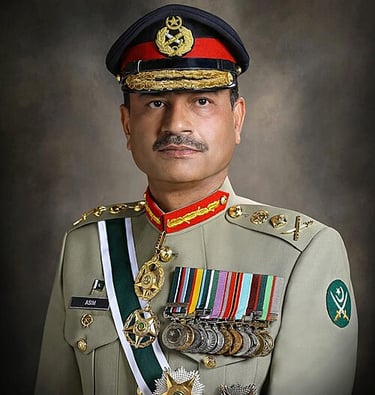Terrorist Confession Unveils Pakistan Army Chief Asim Munir Alleged Role in Fueling Terror Networks
A startling revelation by a captured terrorist has reignited global concerns about Pakistan’s alleged support for terror groups. The disclosure points fingers directly at Army Chief Asim Munir, raising questions about state-backed militancy, regional security, and Pakistan’s global image.


By: Bharat Daily Samachar Date: 17 Sep,2025
How a Terrorist Exposed Pakistan Army Chief Asim Munir’s Support to Terrorism
When a captured terrorist revealed shocking details about the support he received from within Pakistan’s power corridors, it pulled the mask off one of the country’s most guarded secrets. His confession did not just expose the workings of terror groups—it pointed directly to Pakistan’s most powerful man, Army Chief General Asim Munir, and his alleged role in sustaining terrorism across South Asia.
This revelation has sparked global debate, reigniting old concerns about whether Pakistan truly wants to fight extremism or continues to quietly nurture it for strategic gain.
A Confession That Shook the Region
According to sources, the terrorist openly admitted that militant groups operating in India and Afghanistan were regularly funded, trained, and sheltered with the blessings of the Pakistan Army. What makes this confession more explosive is the mention of General Asim Munir himself.
The terrorist detailed how financial aid, weapons, and logistical support were handed over through channels directly connected to the army. He also described routes across the border used for transporting arms and the safe houses maintained under military protection.
Such first-hand testimony has raised eyebrows globally because it does not sound like a rogue element within Pakistan—it sounds like a state-sponsored operation.
Pakistan’s Double Game
For decades, Pakistan has positioned itself as both a victim of terrorism and a front-line state in the global “war on terror.” Yet, at the same time, countries like India, Afghanistan, and even the United States have repeatedly accused Islamabad of sheltering and empowering terror outfits.
This latest confession exposes that “double game.” On one hand, Pakistan seeks international aid, sympathy, and diplomatic recognition for its counterterrorism efforts. On the other hand, its most powerful institution—the military—appears deeply tied to the very groups that destabilize the region.
If proven true, these allegations could permanently damage Pakistan’s credibility in the eyes of the global community.
Who Is General Asim Munir?
General Asim Munir was appointed as Pakistan’s Chief of Army Staff in late 2022. He quickly established himself as a strong figure, consolidating military power during a time of political and economic turmoil in the country.
But this confession paints a darker picture. Instead of steering Pakistan towards stability, Munir is now being accused of backing extremist networks that have repeatedly carried out attacks in neighboring countries.
For India, which has lost thousands of lives to cross-border terrorism, this revelation feels like a grim confirmation of what it has been saying all along.
International Fallout
The timing of this revelation could not be worse for Pakistan. The country is struggling with a weak economy, rising inflation, and dependence on international financial institutions like the IMF. It also remains under global watch for terror-financing risks.
If the confession gains traction internationally, it could trigger stronger sanctions, further restrictions on aid, and greater diplomatic isolation.
Already, countries in the West have shown growing impatience with Pakistan’s inability—or unwillingness—to crack down on terror havens. Now, with direct allegations against its Army Chief, the pressure may mount to unprecedented levels.
India’s Position Strengthened
For India, the terrorist’s words serve as valuable evidence on the global stage. New Delhi has consistently argued that Pakistan’s military and intelligence agencies are the backbone of terrorism in South Asia. This fresh revelation adds weight to India’s long-standing claims.
Indian diplomats are likely to use this confession to push for stronger international action, whether in the United Nations, the FATF, or bilateral talks with Western powers.
It also bolsters India’s domestic position, showing the public and the world that terrorism is not just the work of fringe groups—it is state-backed.
Cracks Within Pakistan
Interestingly, the revelations may also widen cracks inside Pakistan. Civil society groups, journalists, and political voices have often accused the military of running the country like a parallel government. Now, with such accusations coming from a terrorist’s own mouth, public distrust in the army could grow.
However, given Pakistan’s strict control over the media and dissent, it remains to be seen how much of this information will actually reach the Pakistani public.
Why the World Should Care
It’s easy to view this as just another India-Pakistan story. But the truth is bigger. Terrorism is not contained within borders—it spreads instability across regions and even continents.
If Pakistan’s army, under General Asim Munir, is truly enabling terrorism, then it becomes a global security threat, not just a regional one. Whether it’s extremist violence in Afghanistan, threats to Western interests, or instability spilling into Central Asia, the consequences are far-reaching.
Conclusion
The terrorist’s confession has pulled back the curtain on what many suspected but few could prove: the deep involvement of Pakistan’s army in fostering terrorism. With General Asim Munir at the center of these explosive allegations, Pakistan faces a crisis of credibility on the world stage.
For India, it’s an opportunity to push harder for accountability. For the global community, it’s a wake-up call to act decisively before state-backed terrorism grows into an even bigger menace.
The world will now watch closely—whether Pakistan continues to deny and deflect, or whether the international pressure finally forces real change.
